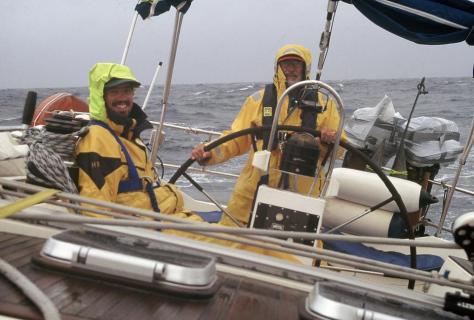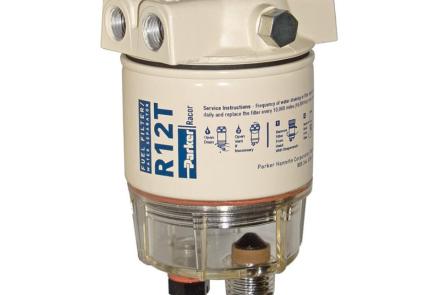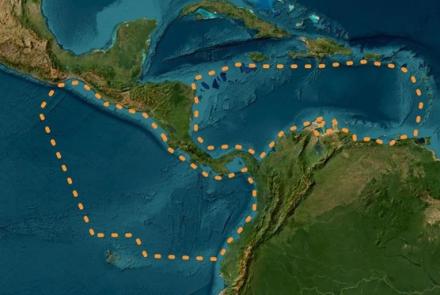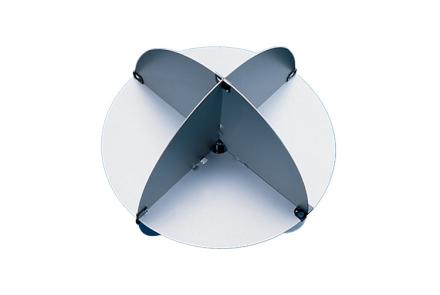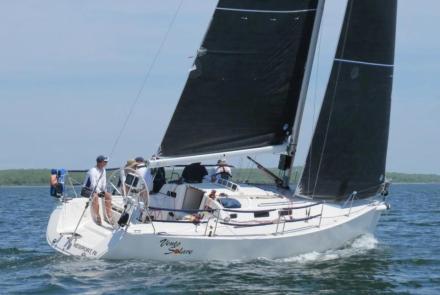Advice to a First Time Offshore Sailor
By Andy Burton, Boston Station
For years, Nick Thornton and I sailed together. We went through the junior sailing program at Royal Victoria Yacht Club in British Columbia, we raced against and cruised with each other in dinghies and keelboats, and as adults we sailed many miles offshore together. During the spring of 2007, he called me about his son. “Sam’s finishing high school and plans to take a year off,” said Nick. “What do you think about taking him on a delivery with you this fall?”
I was a little surprised that he’d trust his eldest to me—after all, Nick knows my whole history—but I’d done something similar at Sam’s age and was delighted to pass on the experience. I’d recently been hired to skipper the late Sir Peter Blake’s former around-the-world race boat, Ceramco NZ, a Farr-designed 68-footer, from Newport, Rhode Island, to the Virgin Islands for the winter. There would be plenty of room for a young and strong—if inexperienced—crewmember.
Sam grew up sailing on his family’s Santa Cruz 27 on Wabamun Lake, near Edmonton, Alberta, but he had little idea what to expect offshore, so I thought about what I wish I’d known before my first passage.
One of your highest priorities should be to stay warm and dry.
Our route from Newport to Bermuda to the Virgins is furrowed with wakes each fall, but that doesn’t mean it isn’t challenging; in fact, it can be dangerous. (While we waited out weather in Bermuda, two people were lost as they tried to abandon their boat 300 miles south of Newport in the remnants of Hurricane Noel.) It would be chilly when we left at the end of October, but that’s when hurricanes become rare and before winter storms become too frequent.
Traveling light would be difficult because the conditions demand that crewmembers carry a wide range of clothing. I told Sam that we usually start out wearing full foul-weather gear with a fleece top; a good, heavy midlayer; and long johns underneath.
Gloves and a warm, windproof fleece hat round out the ensemble.
I loaned Sam my spare foul-weather gear and some fleece-lined, windproof salopettes; he had his own seaboots. “Given that temperatures could be near the freezing mark,” I said, “one of your highest priorities should be to stay warm and dry. Once you get wet, it’s easy to get cold and then for hypothermia to set in, rendering you useless or, worse, a liability.”
Take socks for the first two days only, I advised. The rest of the time you’ll be barefoot or wearing shoes without them. South of Bermuda, the weather starts warming, and it eventually becomes tropical as we near the Caribbean. A few short-sleeved T-shirts, a long-sleeved shirt for sun protection, a bathing suit, and several pairs of shorts will probably be the only clothing you’ll need. Bring a camera. To pack it all, I told Sam to make sure he brought soft luggage-hard suitcases would only get him laughed at. I pack my gear that absolutely has to stay dry in a dry bag just in case of deck leaks.
If it’s really rough, shift into four-wheel drive
Sam had my spare safety harness, and I went over the quick-stop method of picking up a man overboard with him and the rest of the crew. But I emphasized to everyone that their chances of rescue are slim if they go over the side. Therefore, we always wear our harnesses and clip in at night and in dodgy weather. Since nautical lore has it that most drowned sailors are found with their flies open, we never pee over the rail offshore; we always use the head.
Brace yourself. A tripod is inherently stable, so if it’s wavy and you have to work standing up, find something to brace yourself against. Remember the old sea dog’s advice: “One hand for the ship, one hand for yourself!”
In rough weather, it’s especially important to keep a low center of gravity; if it’s really rough, shift into four-wheel-drive, moving about on your hands and knees.
Stay sober. Alcohol is a frequent separator of boats and crews, so I run a dry ship. When we arrive, it makes the first one taste that much better.
One last thing about crew overboard: If you’re below and you hear the cry that someone’s gone over, grab your harness and get it on before you head up the companionway, then clip in as you exit the companionway. Know where your harness is at all times, and how to put it on in the dark. It’s easy to go over the side in the confusion of a crew-overboard situation, and two people in the drink is way worse than just one.
On watch means keeping an eye out for things we can bump into, but that’s not all
When you’re on watch, the boat and everyone aboard are in your hands. First of all, you’re on watch. Keep a good eye out for ships and other things we might hit. But it doesn’t stop there: In addition to scanning the horizon and the sky for impending weather, a good offshore sailor will be looking around the boat and the rig all the time. A small tear in a sail is easy to fix if spotted early, but it’s not so easy to deal with once the sail rips from leech to luff. A mainsheet-block shackle pin that’s starting to back out is no problem to screw in if you notice it when it’s halfway out, but what a pain it is to corral a wildly swinging boom after the pin disappears into orbit. Another word about being on watch: Before you go below, make sure that all the lines are coiled, the water bottles are picked up, and your personal gear goes with you. As Welsh yachtsman Roy Williams is fond of pointing out, “A tidy boat is a happy boat.”
As far as possible, we standardize the way we perform certain operations. Every captain does things his or her own way-and they’re almost all correct, as long as everyone’s on the same page—but on my boat, lines are cleated with a round turn, a diagonal cross, and a half-hitch that ends with the tail parallel to the first cross. Sheets and halyards that are in use will be coiled in a figure eight between the winch and your up-turned palm. And self-tailing winches will always have a “safety turn” around the drum after the line exits the self-tailer. If we follow this routine, when problems come up, anyone coming on deck will be able to undo a line in the dark.
Standard procedure on the boat involves little sleep for me the first day or so. My rule is that if you see anything, call the captain. If you have any doubts about anything, call the captain. If you can’t decide whether to call the captain, call the captain. I’ll stick my head up and either help you to deal with the problem or decide it’s nothing, but I’d always rather be woken.
Line up the headstay with a cloud, then just glance at the compass every now and again
The autopilot didn’t work on Ceramco NZ. That was all right: With a crew of six, we’d have plenty of hands, and she’s a fun boat to drive. Still, Sam found that she felt a little different from a 27-footer on the lake. Sam had shown me that he was a good helmsman during sea trials on Ceramco NZ, but he’d be sailing in waves for the first time.
When we’re offshore, we sail a compass course, and the waves are always trying to send us off course. A common mistake neophytes make is to fix their gaze on the compass and try to keep the boat right on the mark. But that’s almost impossible; you end up overcorrecting because the lubber line only tells you where you are at that moment. Besides, it’s boring to just stare at the compass. To keep the boat on course, line the headstay up with a cloud or a star-remember poet John Masefield’s desire for “a star to steer her by”—then just glance at the compass every now and again for reference.
The other secret to steering in waves is anticipating what the boat will do when a wave rolls under it. Part of this involves getting a feel for the boat you’re on, but generally boats behave in the same way. Quartering seas—that is, seas that are coming from the aft corner of the boat—are the most difficult in which to steer. Try to keep the boat under the mast. When a wave comes and the boat rolls to leeward, it’ll want to round up to weather. As the wave starts to roll under the stern you’ll feel it in the soles of your feet and from pressure on the wheel; this is the time to put the helm up, steering to leeward slightly. As the wave passes, the boat will come more upright, and the wave will try to pull the bow to leeward—you’ll feel it; this is the time to put the helm down a bit. This can be trying at first, but with practice it can be the most delightful rhythm, and it makes your watch pass quickly.
Living on a boat is like living in a very small town
In the big city, you’re anonymous; you can be as selfish as you like. But living on a boat is like living in a very small town: All your neighbors know you far too well. They know what’s in your seabag, that you snore like a Harley, and more than they ever wanted to about your personal hygiene. Everything you do on the boat affects the rest of the crew. So keep your bunk tidy, put your clothes away, do your chores without having to be asked, don’t mess up the galley, and try to be quiet so you don’t wake those who are sleeping.
One thing that can be pretty unpleasant—especially once we reach the tropics—Is the head. It’s important to keep it clean or it will reek, and when the hatches are all closed, it’s worse. If we’re in rough weather, gentlemen are requested to take a seat. If your aim is momentarily bad, clean up after yourself. After taking a shower, dry the head with a chamois or an old towel.
Unless we’ve eaten it first, we never put anything in the head-with the exception of a minimum amount of T.P. I don’t need to tell you what kind of a job it is to take apart and unclog the head while we’re bouncing around at sea.
Things never go quite as planned, so keep a positive attitude
If it’s windy and rough, just remember that nothing lasts forever. The worst weather will pass, and the seas will subside; eventually, you’ll have the memory of some incredible scenery and a couple of good sea stories. Keep your head, and the fact that we were all terrified will fade away by the second telling of the tale. Above all, keep a positive attitude. If you bitch and moan about how terrible the situation is, you’ll just bring everyone on board down. They already know things are bad; they don’t need you to tell them. Life never quite goes as planned when you’re at sea on a small boat—and they’re all small boats out there—but if you have the right outlook you’ll be able to accept that some things just can’t be changed. Morale is much better if we all just grin and joke and try to make the best of any situation.
CCA Member and Author Andy Burton has more than 450,000 miles under his keel, both as a professional delivery captain and on his personal boats. As a result, Andy has had many opportunities to train new crewmembers in the fine art of going to sea. More can be found on his website.
https://sites.google.com/site/andrewburtonyachtservices/andrew-burton-yacht-delivery
The Cruising Club of America is a collection of accomplished ocean sailors having extensive boat handling, seamanship, and command experience honed over many years. “Safety Moments” are written by the Club’s Safety Officers from CCA Stations across North America and Bermuda, as well as CCA members at large. They are published by the CCA Safety and Seamanship Committee and are intended to advance seamanship and safety by highlighting new technologies, suggestions for safe operation and reports of maritime disasters around the world.


